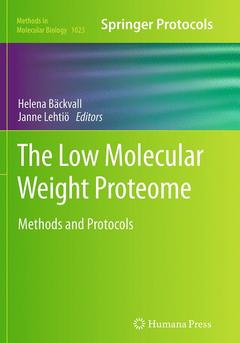Description
The Low Molecular Weight Proteome, 2013
Methods and Protocols
Methods in Molecular Biology Series, Vol. 1023
Language: English
Subject for The Low Molecular Weight Proteome:
Support: Print on demand
Publication date: 06-2013
223 p. · 17.8x25.4 cm · Hardback
Description
/li>Contents
/li>Comment
/li>
Small proteins with molecular weights of <25 kDa are involved in major biological processes such as ribosome formation, stress adaption and cell cycle control. The study of the low-molecular-weight proteome has identified many central regulators of biology such as cytokines, chemokines, peptide hormones and proteolytic fragments of larger proteins. Due to the unique features of these proteins, the technical challenges are different from those in ?common? proteomics. In The Low Molecular Weight Proteome: Methods and Protocols expert researchers from the field provide protocols for analysis of low molecular weight proteins and peptides, protocols for such methods applied in clinical research and an up-to-date review of quantitative protein profiling by labeling. These include methods suitable for both peptide and protein analysis with focus on methods and application that can be used for small protein analysis. Written in the highly successful Methods in Molecular Biology? series format, chapters include introductions to their respective topics, lists of the necessary materials and reagents, step-by-step, readily reproducible laboratory protocols, and key tips on troubleshooting and avoiding known pitfalls.
Authoritative and practical, The Low Molecular Weight Proteome: Methods and Protocolsis a useful resource for experienced proteomics practitioners as well as an aid to newcomers who wish to become acquainted with the theory and practice of a wide array of methods in analyzing small proteins or peptides.
Narrow Range Peptide Iso Electric Focusing as Peptide Prefractionation Method Prior to Tandem Mass Spectrometry Analysis.- Analysis of Peptides by Denaturing Ultrafiltration and LC-MALDI-TOF-MS.- Stable Isotope Labeling Methods in Protein Profiling.- Development of MRM-based Assays for the Absolute Quantitation of Plasma Proteins.- Mass Spectrometric Profiling of Low-Molecular-Weight Proteins.- Developing an iMALDI Method.- Analysis of Neuropeptides by MALDI Imaging Mass Spectrometry.- Highly Multiplexed Antibody Suspension Bead Arrays for Plasma Protein Profiling.- Protein Quantification by Peptide Quality Control (PQPQ) of Shotgun Proteomics Data.- Collection and Handling of Blood Specimens for Peptidomics.- An Automated RP-SCX Solid Phase Extraction Procedure for Urinary Peptidomics Biomarker Discovery Studies.- Application of Phage Display for Ligand Peptidomics to Identify Peptide Ligands Binding to AQP2-expressing Membrane Fractions.- Protein Expression Profiling of Brain Tumor Tissue Using SELDI-MS.- Comprehensive Analysis of MHC Ligands in Clinical Material by Immunoaffinity - Mass Spectrometry.




